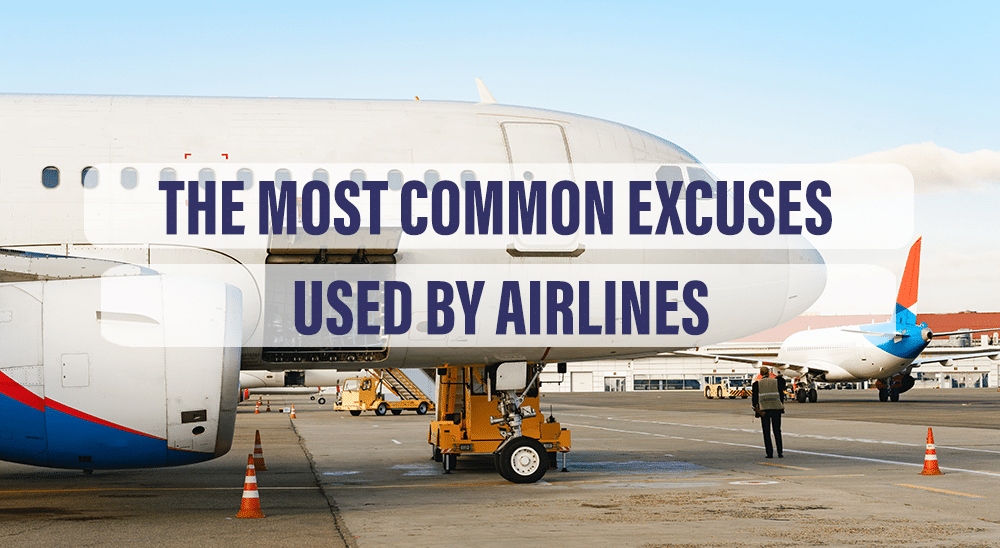Before delving into the most common excuses from airlines, it is crucial to understand that most of them are canned responses, typically applied without going into details. Our analysis is based on thousands of customer complaints, synthesizing the most widespread responses, often simple justifications.
We use the term ‘generally’ because sometimes these responses are genuine and are indeed considered exceptional circumstances.
So, if you’ve faced a refusal from the airline after submitting a claim on your own (about 90% of people receive a negative response when they act alone), it’s essential to understand that this was predictable and it’s still very likely that you can still submit your claim.
If the airline justifies that a claim is not possible due to exceptional circumstances:
“In many cases, you have the right to claim even if the airline cites exceptional circumstances. The standard response you’ll often hear is as follows:
‘We deeply regret to inform you that, according to Regulation (EC) No. 261/2004 of the European Parliament and of the Council of 11 February 2004, the air carrier responsible for the flight is not obliged to pay compensation in the event of a delay due to exceptional circumstances. We thank you for your understanding regarding the constraints we face due to factors entirely independent of our company and which have a direct impact on our operation.’
Common excuses used by airlines typically ends with mentions such as: ‘In this case: adverse weather conditions, strike, breakdown…
What to understand regarding exceptional circumstances to file a flight claim:
Adverse weather conditions
If it is proven that the weather conditions were manifestly adverse, this is considered an exceptional circumstance, making any claim impossible. However, passengers often cite this circumstance even when other flights were uneventful, or the weather conditions were not sufficiently adverse. Sometimes, they use this excuse even in the presence of bright sunshine. Unless extreme events such as a hurricane, heavy snowfall, or floods occur, it is essential to verify that this excuse is not unjustified. Our experts are able to confirm this.”
Due to the unpredictable and inevitable nature of the incident, the AIRLINE could not avoid it despite applying all reasonable measures. All circumstances were beyond the effective control of the airline, making it impossible to take additional measures to minimize the inconvenience caused.”
If the airline apologizes due to strikes:
“While some situations, like air traffic controller strikes, are not eligible for claims, those involving airline staff are. For example, the Ryanair strike across Europe in the summer of 2018 can be subject to a claim. The Court of Justice of the European Union (CJEU), in its ruling on April 17, clarifies that ‘the spontaneous absence of a significant portion of an airline’s navigation personnel does not constitute an “extraordinary circumstance” exempting the airline from compensating affected passengers. According to the CJEU, a strike by staff is not a case of ‘force majeure’ if the criteria of exteriority (external to the airline), inevitability, and unpredictability are not met.”
If the excuse is a plane breakdown:
“The airline is responsible for the proper functioning of its planes. Therefore, any breakdown that occurs is its responsibility and may be subject to a claim. The only exception to this rule occurs when a breakdown occurs in-flight. In such cases, the pilot is allowed, for safety reasons, to make the decision they deem necessary without incurring legal consequences.”
If the provided response is that the plane is from another origin:
“It may happen that our plane does not come from another destination, and in this case, the airline may claim that it encountered problems independent of its responsibility. Nevertheless, this situation remains subject to a claim.”
The frequently cited excuse is that the crew exceeded their flying hours:
“Sometimes, the crew does indeed exceed their flying hours, often due to poor organization. In such cases, it is possible to file a claim. It is the responsibility of the airline to manage flight hours effectively and ensure the smooth running of flights.”
Common excuses: Typical responses from airlines
The most common excuses used by airlines are the following ones:
1. Response – Excuse: “We offer our sincerest apologies. However, it is essential to note that, according to Regulation (EC) 261/2004 of the European Parliament and of the Council of February 11, 2004, the airline operating the flight is not obliged to pay compensation in the event of a delay due to exceptional circumstances. We would appreciate your understanding of the limitations we face due to factors entirely independent of our company, which have a direct impact on the smooth operation of our services.”
2. Response – Excuse: “We regret to inform you that, in your case, no financial compensation is applicable due to the delay or cancellation of the flight, which are due to circumstances beyond our company’s control. This is in accordance with the regulations of European Regulation 261/04 of February 11, 2004.”
3. Response – Excuse: “We want to express our regrets by confirming our initial position, based on the documentation provided and the arguments presented in your letter. After thorough analysis, no elements have been identified to justify a change in our previous decision. We appreciate your feedback, which helps us continuously improve our services to better meet the needs of our customers.”
4. Response – Excuse: “We sincerely apologize to inform you that no compensation is applicable in your situation as the incident was caused by ‘exceptional circumstances.’ Due to the unpredictable nature of the event, beyond our control, we unfortunately could not implement additional measures to mitigate the inconvenience caused.”

5. Response – Excuse: “This disruption was caused by extraordinary circumstances which could not have been avoided even if all reasonable measures had been taken.”
6. Response – Excuse: “We offer our sincerest apologies to inform you that your flight was canceled due to an unjustified strike by our cabin crew. We communicated this information to our customers in German, Spanish, Portuguese, and Italian on 28.09.18. Despite our intensive efforts to avoid these disruptions, the unions maintained their intention to strike on 28.09.18. We are informing you today so that you can change your flight for an alternative date or obtain a refund. We understand the impact this may have on your travel plans, and we kindly ask you to accept our apologies for these inconveniences.”
7. Response – Excuse: “Thus, as this flight is not originating from a European Union member state and the airline in question is not European, the envisaged compensation is not applicable according to the applicable regulations.”
8. Response – Excuse: “As this is a flight operated by an American company with a delay occurring in the United States, the compensation provided for in the European Regulation is not applicable in this case.”
If you have suffered a cancellation, delay or overbooking and the airlines have replied with any of these excuses, please contact us through lexority.com

